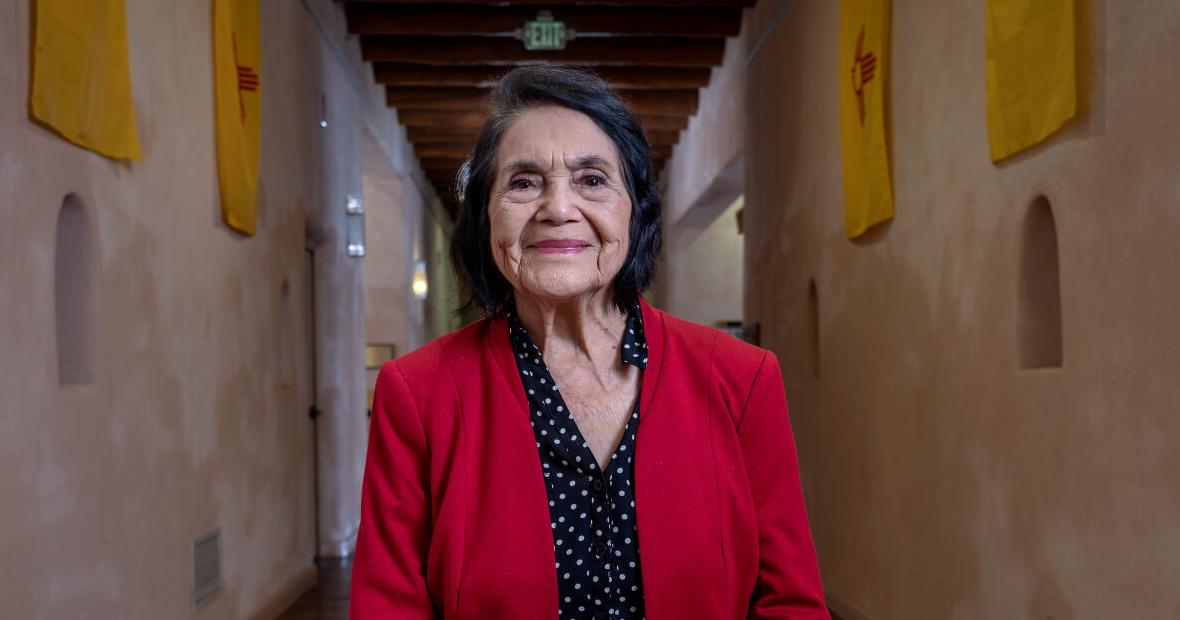Courage in Action: Dolores Huerta's Powerful Blueprint for Social Change
Lifestyle
2025-04-13 14:00:00Content

A trailblazing force in social justice, Dolores Huerta stands as an iconic figure in labor rights and feminist activism. Her groundbreaking work began in 1962 when she joined forces with César Chávez to establish the National Farm Workers Association, the first labor union dedicated to protecting agricultural workers in the United States. This pioneering organization would later evolve into the renowned United Farm Workers, transforming the landscape of workers' rights.
Beyond her labor organizing, Huerta has been a powerful advocate for women's empowerment, working closely with prominent organizations like the Feminist Majority Foundation. Her commitment to social change reached a pinnacle moment when she served as an honorary co-chair of the influential 2017 Women's March in Washington, D.C., further cementing her legacy as a tireless champion of equality and justice.
Throughout her remarkable career, Huerta has consistently demonstrated that one passionate individual can spark profound social transformation, inspiring generations of activists and changemakers across the United States.
Dolores Huerta: The Unstoppable Force Behind Farm Workers' Rights and Social Justice
In the tapestry of American social activism, few individuals have woven threads of change as powerfully and persistently as Dolores Huerta. Her remarkable journey transcends mere activism, representing a profound commitment to human dignity, workers' rights, and social transformation that has reshaped the landscape of labor and civil rights in the United States.Pioneering Change: A Legacy of Empowerment and Resilience
The Birth of a Movement: Grassroots Organizing and Collective Empowerment
Dolores Huerta's transformative work emerged during a critical period of social upheaval in mid-20th century America. Her collaboration with César Chávez was not merely a professional partnership but a revolutionary approach to challenging systemic inequalities faced by agricultural workers. The National Farm Workers Association, which would later evolve into the United Farm Workers, represented more than a union—it was a powerful mechanism for social mobility and human rights advocacy. The organization's foundational principles were rooted in nonviolent resistance, drawing inspiration from civil rights movements and labor organizing strategies. Huerta's strategic brilliance lay in her ability to mobilize marginalized communities, transforming individual frustrations into collective action. Her approach combined grassroots organizing with sophisticated political negotiation, creating a model for social change that would inspire generations of activists.Intersectional Activism: Breaking Barriers Beyond Labor Rights
Huerta's activism extended far beyond agricultural labor organizing. Her commitment to feminist principles and social justice created a multidimensional approach to advocacy that challenged multiple systems of oppression simultaneously. By collaborating with women's rights organizations like the Feminist Majority Foundation, she demonstrated an intersectional understanding of social change. Her role as an honorary co-chair of the 2017 Women's March in Washington, D.C. symbolized her ongoing commitment to progressive social movements. This involvement highlighted her ability to adapt and remain relevant across different generations of activists, bridging historical struggles with contemporary social justice movements.Leadership and Inspiration: Cultivating Future Changemakers
Beyond her organizational achievements, Huerta's most profound impact lies in her role as a mentor and inspirational figure. She has consistently emphasized education, political engagement, and community empowerment as essential tools for social transformation. Her famous rallying cry, "Sí se puede" (Yes, we can), has become a universal motto of hope and collective action. Through her speaking engagements, workshops, and ongoing activism, Huerta has trained countless individuals in community organizing, leadership development, and civic engagement. Her work demonstrates that true social change requires not just structural reforms but also personal empowerment and collective consciousness.Legacy and Continuing Impact: A Living Testament to Persistent Activism
Dolores Huerta's journey represents more than a historical narrative—it is a living testament to the power of persistent, principled activism. Her contributions have fundamentally reshaped understanding of labor rights, immigrant experiences, and social justice in the United States. By challenging systemic inequalities and creating sustainable organizational structures, she has left an indelible mark on American social movements. Her ongoing work through the Dolores Huerta Foundation continues to promote community organizing, civic engagement, and leadership development in marginalized communities. This sustained commitment ensures that her legacy is not merely commemorative but actively transformative, continuing to inspire new generations of social justice advocates.RELATED NEWS
Lifestyle

Couch Potato Syndrome: How Your Sedentary Habits Could Be Silently Threatening Your Brain Health
2025-04-21 18:58:24
Lifestyle

Literary Luminaries Collide: Tucker and Houston Spark Conversation at Garcia Street Books
2025-03-22 16:00:00
Lifestyle

Green Action Alert: Community Rallies for Wigi Wetlands Restoration Project
2025-03-19 10:19:04





